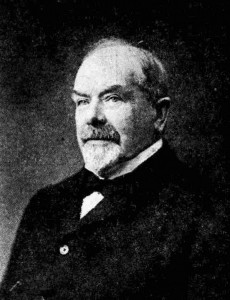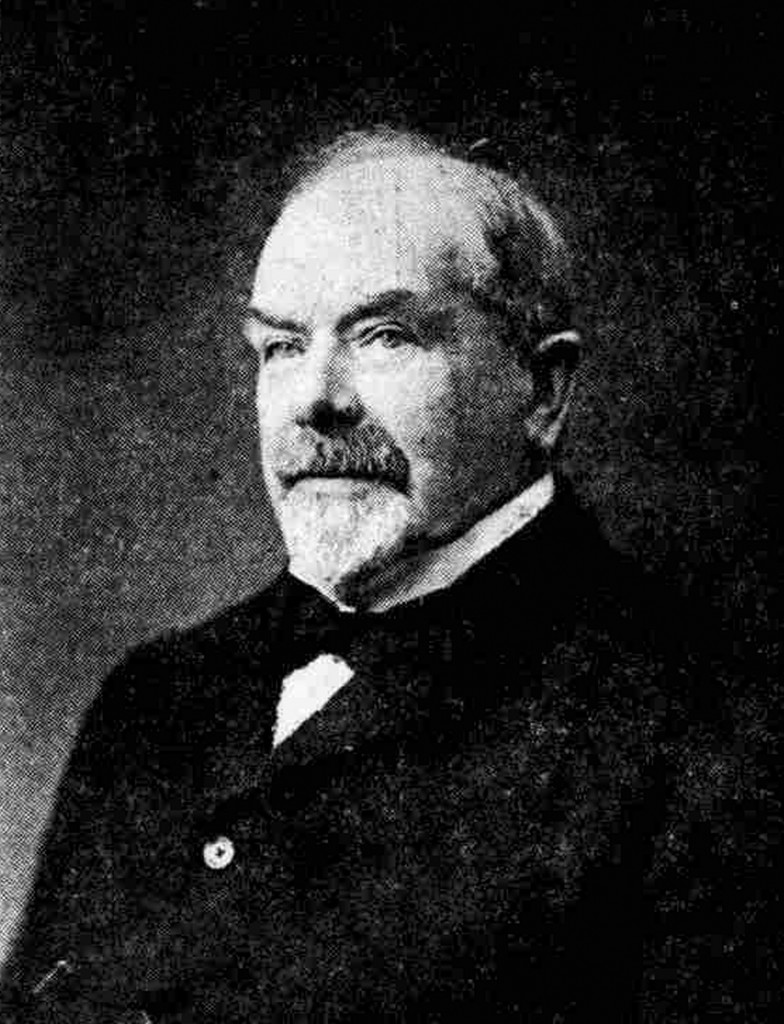Henry Escritt (1836-1913)
HENRY Escritt was born at Ross-in- Holderness, Yorkshire, and was educated at Great Driffield, but played a substantial part in Victorian Grantham.
Possessing the indomitable perseverance and determination to succeed of the typical Yorkshireman, he came to Grantham in 1860, described as “ robust in body, alert mind, and equipped with a thorough and practical knowledge of the printing trade”.
He entered into partnership with Joseph Rogers, proprietor of the Grantham Journal, becoming sole owner of the paper in 1862.
At that time the Journal was a four-page sheet of limited circulation. Not only was it enlarged and improved, but its influence was widely extended throughout the countryside. It is interesting to note how eagerly the tradespeople of that time took advantage its columns as an advertising medium.
 Mr. Escritt also established the Lincoln Journal, which became a very flourishing concern. He found it, however, somewhat difficult to manage so far from the city, and eventually disposed of the property to Lincoln gentlemen. It ultimately became merged into another paper.
Mr. Escritt also established the Lincoln Journal, which became a very flourishing concern. He found it, however, somewhat difficult to manage so far from the city, and eventually disposed of the property to Lincoln gentlemen. It ultimately became merged into another paper.
The proprietor established a corps of correspondents throughout the district, and by degrees its circulation covered not only South Lincolnshire, North Leicestershire, South Notts, but the entire county of Rutland and North Northants, with special agencies Melton, Bourne, Oakham, and Uppingham.
But perhaps Mr. Escritt was best known throughout a wide area auctioneer, valuer, and estate agent.
He established his practice the early sixties, and threw himself into it with characteristic ardour.
He especially enjoyed the cattle market, selling a large entry beast, sheep, and pigs.
A business man first of all, he was never too busy to give or take a joke, and probably man ever enjoyed greater popularity in the sale ring.
As a valuer be acted for many distinguished clients, and it was a matter of considerable pride to him that his firm was chosen to value for probate at Burghlev House, Denton Manor, Aswarby Hall, and other great houses the neighbourhood.
His wide and extensive knowledge of agricultural law and customs caused his services to be very much in requisition.
He was always first in his own office, and after a long day in the country it was quite a regular practice with him to work until a late hour, week after week, and month after month, during the busy season.
Naturally he expected his staff to display equal energy, and the amount of work turned out at the office was truly amazing. Promptitude, Punctuality, and Accuracy may be described his watchwords,
He took into partnership for the auctioneering department. Mr. C F Barrell, of Spalding, who eventually (in 19041 acquired the sole control, and the firm still widely and honourably known Escritt and Barrell, the headquarters of the business being Elmer House. Finkin Street.
In the Diamond Jubilee year of Queen Victoria, he made a gift of the newspaper to his only son Henry Manners Escritt and retired to Bournemouth
As director of the Gas and Water Companies and of tanners A &J Shaw, Ltd., he frequently came over Grantham, and the interests of his trusteeships in local charitable societies were never neglected.
Mr Escritt was far too busy a man to take much part in the public life of the town, but for over 20 years he rendered very useful service one of the Borough Auditors.
He married a daughter of John Dickinson,
In February, 1910, lie suffered the loss of his only son very sad circumstances, and the bereavement was a great blow to him. Indeed, it is much to be questioned whether he ever fully recovered from this.
His one desire was to regain possession of the Journal, and after negotiations with the executors the property once mere became his. He returned to Grantham, and temporarily took his residence on St Peter’s Hill, then to Hill Side, Harrowby, formerly the quarters the Militia Adjutants. Here for a time he seemed to recover all his old vigour.
In the winter of 1912 he suffered severely from asthma and heart weakness, and was only able to take the air on fine bright days in his bath chair. N
He realised that the time had arrived bring the’ composing-room into line with modern requirements. This idea had time after time been postponed entirely on account of sentimental reasons. The introduction of type-setting machinery, course, meant the displacing of a certain amount hand labour, and Mr Escritt naturally hesitated a great deal before he adopted a policy which would mean the dismissal of men who had served him faithfully for many years.
But he could not help recognising the fact that tbe Journal was practically the only paper within a very wide area that was set up by hand compositors, and reluctantly he gave the order for the installation of the latest and most improved pattern Linotypes.





Leave a Reply
You must be logged in to post a comment.